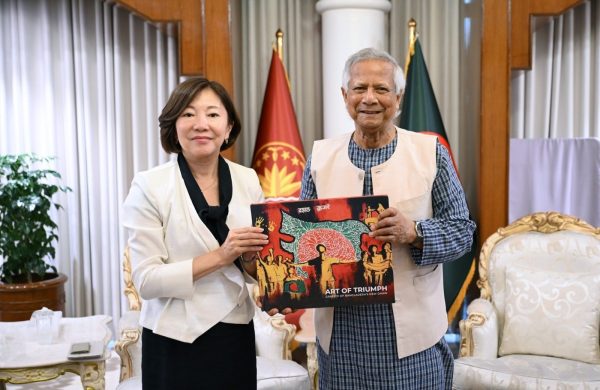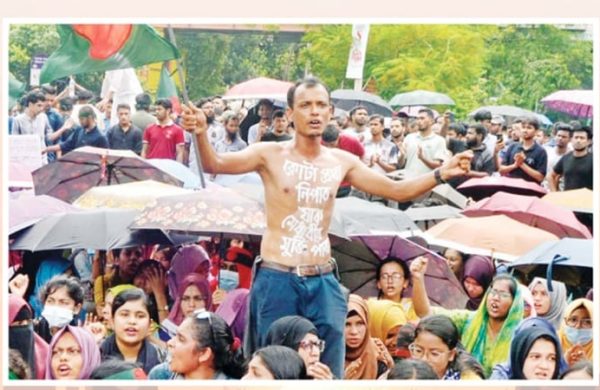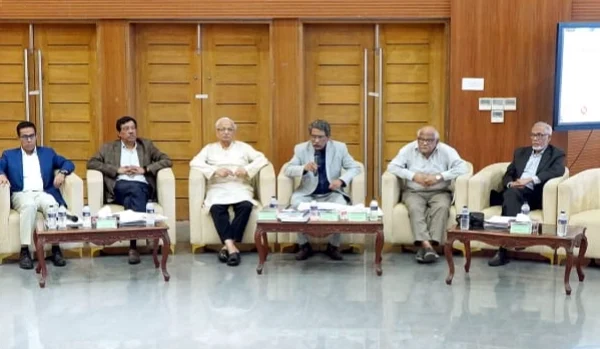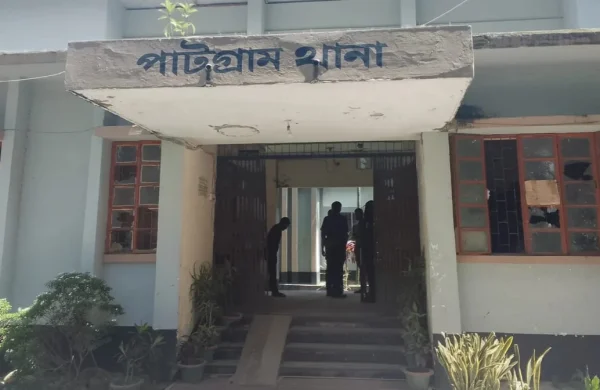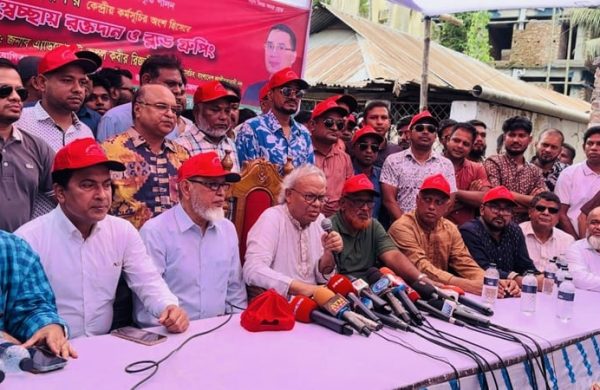Reform commission draft recommends bicameral parliament with 505 seats
- Update Time : Tuesday, January 14, 2025

TDS Desk:
The Constitutional Reform Commission is set to recommend making the National Parliament bicameral. According to the draft proposal, the lower house of parliament will have 400 seats, with elections held under the prevailing system.
Among these, 100 seats will be reserved for women, who will be elected directly. The upper house will consist of 105 seats, with elections conducted using a proportional representation system. In total, the two houses of parliament will comprise 505 seats.
This information has been gathered from sources within the Constitutional Reform Commission.
The commission aims to make several recommendations to prevent constitutional dictatorship and ensure a balance of power so that authority does not become concentrated in the hands of a single individual.
Additionally, the commission will propose changes to the fundamental principles of the existing constitution. The Constitutional Reform Commission is finalising its proposals and is in the final stages of its work. It plans to submit its report to the interim government’s chief advisor, Dr. Muhammad Yunus, on Wednesday.
Apart from the Constitutional Reform Commission, the Electoral System, Anti-Corruption, and Police Reform Commissions are also set to submit their reports on Wednesday.
The remaining two commissions formed in the first phase – the Judiciary and Public Administration Reform Commissions – are scheduled to submit their reports by the end of this month.
Sources indicate that the reform commissions will propose several fundamental changes within their respective domains. Their recommendations will fall into two categories: those that can be implemented in the short term and those requiring a longer timeline.
However, implementing some of the recommendations will require constitutional amendments. Since there is currently no parliament, these constitutional amendments cannot be enacted until a new parliament is formed through elections.
Once the interim government receives the commissions’ reports, it will initiate a dialogue with political parties. These discussions are expected to begin later this month. If consensus is reached on the reform proposals and their implementation, the dialogue may result in a roadmap or outline, according to individuals familiar with the matter.
HOW BICAMERAL PARLIAMENT WORKS
Since independence, the country’s parliament, known as the Jatiya Sangsad, has been unicameral. Under the existing constitution, the parliament consists of 350 seats, with 50 seats reserved for women. These reserved seats are allocated to political parties in proportion to the number of general seats they win in elections.
The Reform Commission’s draft proposal suggests that elections for the 400 seats in the lower house will continue under the current system. For the upper house, out of a total of 105 seats, five will be directly nominated by the President. This provision aims to ensure the representation of various marginalised and disadvantaged sections of society.
Elections for the remaining 100 seats in the upper house will be conducted under a proportional representation system. Political parties will secure seats in the upper house based on the proportion of votes they receive nationwide. The proposal also emphasises that parties should ensure diverse representation when nominating candidates for the upper house.
Several political parties, including the Bangladesh Nationalist Party (BNP), have long advocated for a bicameral parliament. The BNP reiterated this demand in its 62-point proposal, which it submitted in writing to the Constitutional Reform Commission.
Similarly, the Jatiya Nagorik Committee has called for the formation of a bicameral parliament. During discussions between the Constitutional Reform Commission and the Electoral Reform Commission, many participants also supported the introduction of a bicameral system.
According to relevant sources, the Electoral Reform Commission is also likely to recommend that elections for the lower house be held under the existing system, while elections for the upper house adopt a proportional representation.
ONE OF THE OBJECTIVES IS TO PREVENT DICTATORSHIP
The Constitutional Reform Commission sources said that one of the goals of their recommendations is to contain the desire during the mass uprising and prevent a constitutional dictatorship. To achieve this, emphasis will be placed on the decentralisation of power so that there is no opportunity for power to be concentrated in the hands of one individual.
To this end, a bicameral parliament will be established. The commission will also recommend specifying a maximum number of terms a person can serve as prime minister, introducing a provision to prevent the prime minister from simultaneously being the party chief and the parliamentary leader, ensuring accountability of the executive branch, instituting a provision for an interim government during elections, and bringing a balance of power between the prime minister and the president.
Additionally, the commission will propose a balance of power among the executive, legislative, and judicial branches, along with measures to ensure the independence of the judiciary. These are among the key issues the commission is prioritising.
Furthermore, recommendations are being made to revise the fundamental principles of the constitution. The commission plans to propose the inclusion of three core principles: “Equality, human dignity, and social justice.” Two additional principles may also be added alongside these three.
He stated that power has historically been centralised in one individual, and the commission is making recommendations to prevent this from happening in the future.
Ensuring accountability within the executive branch, creating a balance of power between individuals and institutions, and preventing abuse of power are key priorities in the recommendations.
EFFECTIVE ELECTORAL SYSTEM IS ANOTHER OBJECTIVE
According to sources in the Electoral Reforms Commission, the commission is preparing a proposal to build an effective system for free, impartial, and fair elections in the long term.
To achieve this, the commission will recommend institutional changes alongside amendments to existing laws to strengthen the election commission.
Recommendations include ensuring elections under a neutral caretaker government, introducing changes in rules to allow the election commission control over institutions involved during elections, and amending the Chief Election Commissioner and other Election Commissioners Appointment Act.
Changes to the National Assembly Election Act, increasing the powers of the election commission in the Representation of the People Order (RPO), and creating mechanisms to hold the election commission accountable are also being proposed.
Additionally, the commission aims to make provisions for punishment and actions in the RPO more specific, change the affidavit form to require candidates to disclose details of assets abroad, and mandate verification of affidavit information.
Other proposals include adding a provision for ‘no’ votes, ensuring direct voting for reserved seats for women, and introducing changes in the nomination process for political parties.
Electoral Reform Commission head Badiul Alam Majumder that the commission will submit its report on Wednesday. The report will contain the well-considered opinions of the commission.
These recommendations are expected to be discussed with the government, political parties, and other stakeholders.
He expressed hope that consensus can be reached through these discussions.
ACC Reform Commission recommends making it independent
Iftekharuzzaman, head of the ACC Reform Commission that the commission will submit its report to the chief advisor tomorrow, Wednesday.
According to sources, the ACC Reform Commission will propose amendments to the ACC Chairman and Commissioner Appointment Act. The proposed changes aim to establish a transparent process for appointing qualified individuals free from political influence.
Recommendations will also focus on making the ACC genuinely independent and impartial, enhancing its institutional status, and ensuring balanced representation within its workforce.
Currently, a single cadre of officials, from the secretary level, holds predominant authority within the ACC. The commission plans to suggest measures to ensure fair opportunities for all personnel while also introducing mechanisms to address and control irregularities among staff.
A framework will be proposed to guarantee the accountability of the ACC. Additionally, the commission will recommend modernising the process for verifying and sorting corruption allegations to eliminate delays and inefficiencies.
The interim government, which came to power through the student-public uprising, announced comprehensive reforms across various sectors. In the first week of October, six commissions were fully formed, with an official notification issued to this effect. Another six commissions were established in the second phase, and their reports are expected to be submitted by the end of next month.
While the reform commissions’ recommendations are seen as significant, there is scepticism about the extent of consensus that can be achieved in the current political climate. Differences of opinion regarding elections and reforms have emerged prominently in the political sphere.
However, political analyst Professor Mahbub Ullah remains optimistic. He that existing political differences, including those voiced by the BNP, Jamaat, and student groups, are not insuperable.


